 W
WBlack Mischief was Evelyn Waugh's third novel, published in 1932. The novel chronicles the efforts of the English-educated Emperor Seth, assisted by a fellow Oxford graduate, Basil Seal, to modernize his Empire, the fictional African island of Azania, located in the Indian Ocean off the eastern coast of Africa.
 W
WBrideshead Revisited, The Sacred & Profane Memories of Captain Charles Ryder is a novel by English writer Evelyn Waugh, first published in 1945. It follows, from the 1920s to the early 1940s, the life and romances of the protagonist Charles Ryder, most especially his friendship with the Flytes, a family of wealthy English Catholics who live in a palatial mansion called Brideshead Castle. Ryder has relationships with two of the Flytes: Sebastian and Julia. The novel explores themes including nostalgia for the age of English aristocracy, Catholicism, and the nearly overt homosexuality of Sebastian Flyte's eccentric friends at Oxford University. A faithful and well-received television adaptation of the novel was produced in an 11-part miniseries by Granada Television in 1981.
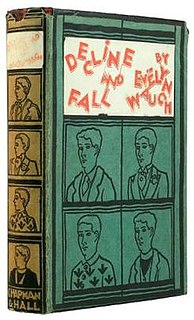 W
WDecline and Fall is a novel by the English author Evelyn Waugh, first published in 1928. It was Waugh's first published novel; an earlier attempt, titled The Temple at Thatch, was destroyed by Waugh while still in manuscript form. Decline and Fall is based, in part, on Waugh's schooldays at Lancing College, undergraduate years at Hertford College, Oxford, and his experience as a teacher at Arnold House in north Wales. It is a social satire that employs the author's characteristic black humour in lampooning various features of British society in the 1920s.
 W
WA Handful of Dust is a novel by the British writer Evelyn Waugh. First published in 1934, it is often grouped with the author's early, satirical comic novels for which he became famous in the pre-World War II years. Commentators have, however, drawn attention to its serious undertones, and have regarded it as a transitional work pointing towards Waugh's Catholic postwar fiction.
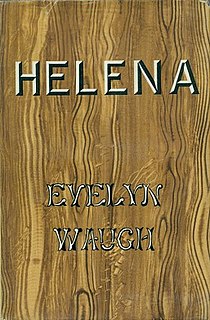 W
WHelena, published in 1950, is the sole historical novel of Evelyn Waugh.
 W
WLove Among the Ruins: A Romance of the Near Future is a 1953 novel by Evelyn Waugh. It is a satire set in a dystopian, quasi-egalitarian Britain.
 W
WThe Loved One: An Anglo-American Tragedy (1948) is a short, satirical novel by British novelist Evelyn Waugh about the funeral business in Los Angeles, the British expatriate community in Hollywood, and the film industry.
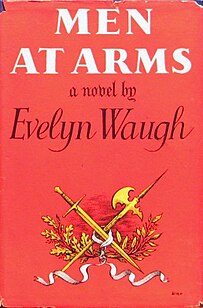 W
WMen at Arms is a 1952 novel by the British novelist Evelyn Waugh.
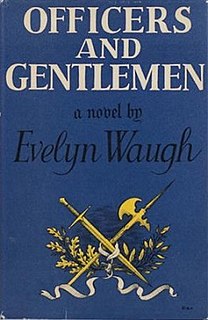 W
WOfficers and Gentlemen is a 1955 novel by the British novelist Evelyn Waugh.
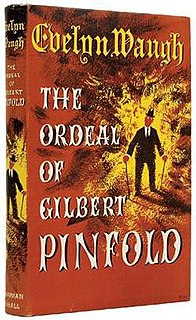 W
WThe Ordeal of Gilbert Pinfold is a novel by the British writer Evelyn Waugh, first published in July 1957. It is Waugh's penultimate full-length work of fiction, which the author called his "mad book"—a largely autobiographical account of a period of hallucinations caused by bromide intoxication that he experienced in the early months of 1954, recounted through his protagonist Gilbert Pinfold.
 W
WPut Out More Flags, the sixth novel by Evelyn Waugh, was first published by Chapman and Hall in 1942. The title comes from the saying of an anonymous Chinese sage, quoted and translated by Lin Yutang in The Importance of Living (1937):
 W
WScoop is a 1938 novel by the English writer Evelyn Waugh. It is a satire of sensationalist journalism and foreign correspondents.
 W
WScott-King's Modern Europe, published in 1947, is a novella by Evelyn Waugh, sometimes called A Sojourn in Neutralia. It was first published in an abridged form in the Cornhill Magazine in 1947, and then by Chapman & Hall, also in 1947. The first American edition, by Little, Brown, appeared in 1949.
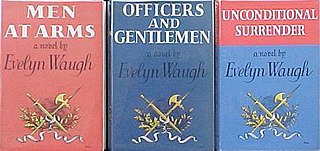 W
WThe Sword of Honour trilogy by Evelyn Waugh consists of three novels, Men at Arms (1952), Officers and Gentlemen (1955) and Unconditional Surrender, which loosely parallel Waugh's experiences in the Second World War. Waugh received the 1952 James Tait Black Memorial Prize for Men at Arms.
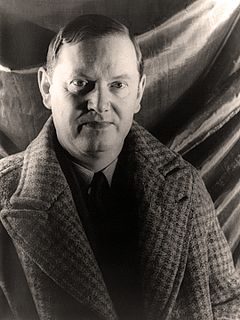 W
WThe Temple at Thatch was an unpublished novel by the British author Evelyn Waugh, his first adult attempt at full-length fiction. He began writing it in 1924 at the end of his final year as an undergraduate at Hertford College, Oxford, and continued to work on it intermittently in the following 12 months. After his friend Harold Acton commented unfavourably on the draft in June 1925, Waugh burned the manuscript. In a fit of despondency from this and other personal disappointments he began a suicide attempt before experiencing what he termed "a sharp return to good sense".
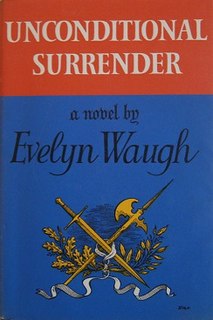 W
WUnconditional Surrender is a 1961 novel by the British novelist Evelyn Waugh. The novel has also been published under the title The End of the Battle. Along with the other two novels in the series, it was adapted into a 2001 TV film with Daniel Craig.
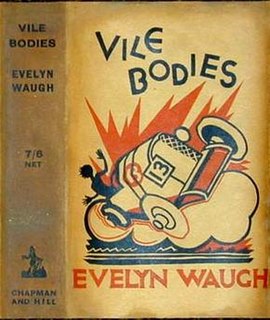 W
WVile Bodies is the second novel by Evelyn Waugh, published in 1930. It satirises the bright young things, the rich young people partying in London after World War I, and the press which fed on their doings. The original title of Bright Young Things, which Waugh changed because he thought the phrase had become too clichéd, was used in Stephen Fry's 2003 film adaptation. The eventual title appears in a comment made by the novel's narrator in reference to the characters' party-driven lifestyle: "All that succession and repetition of massed humanity... Those vile bodies...". The book was dedicated to B. G. and D. G., Waugh's friends Bryan Guinness and his wife Diana.